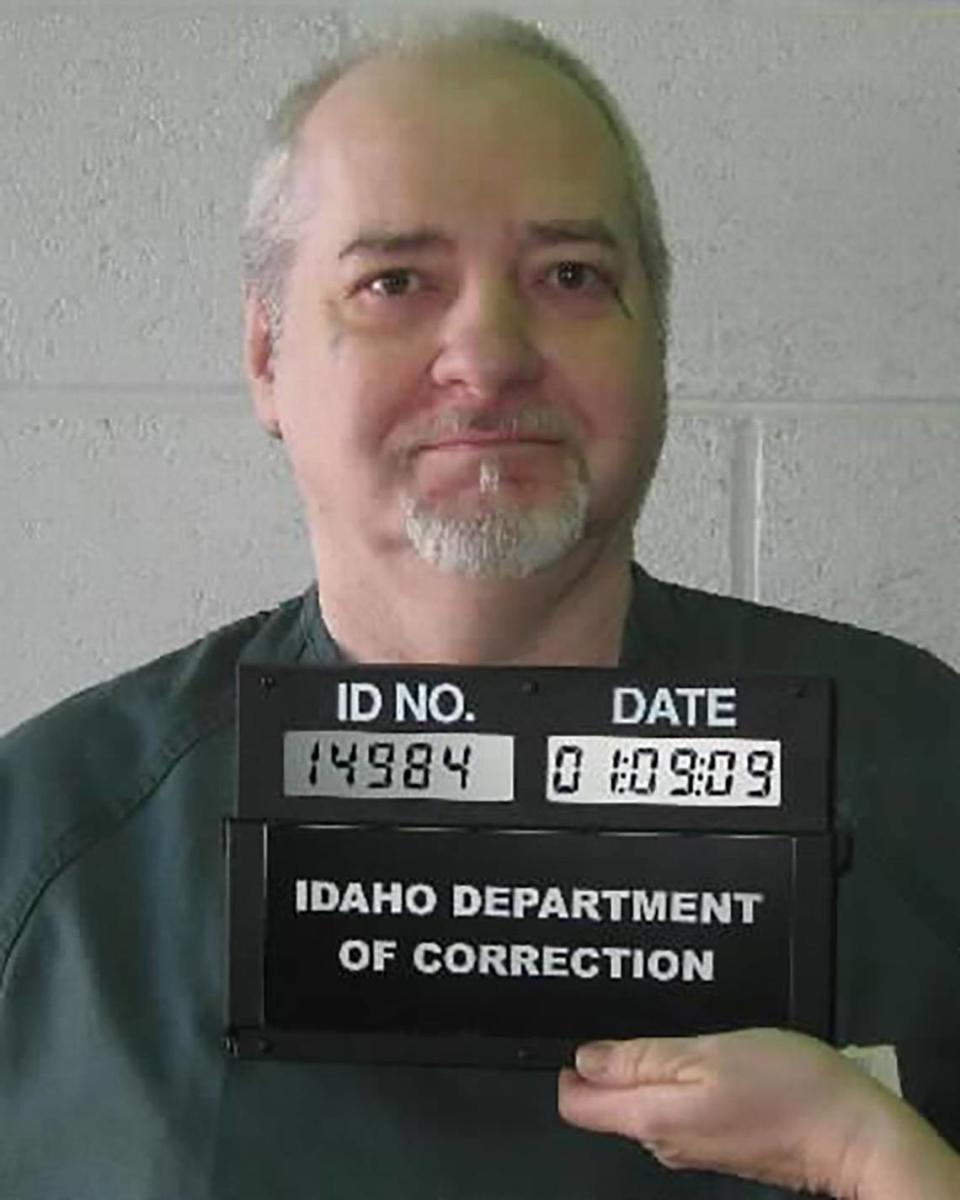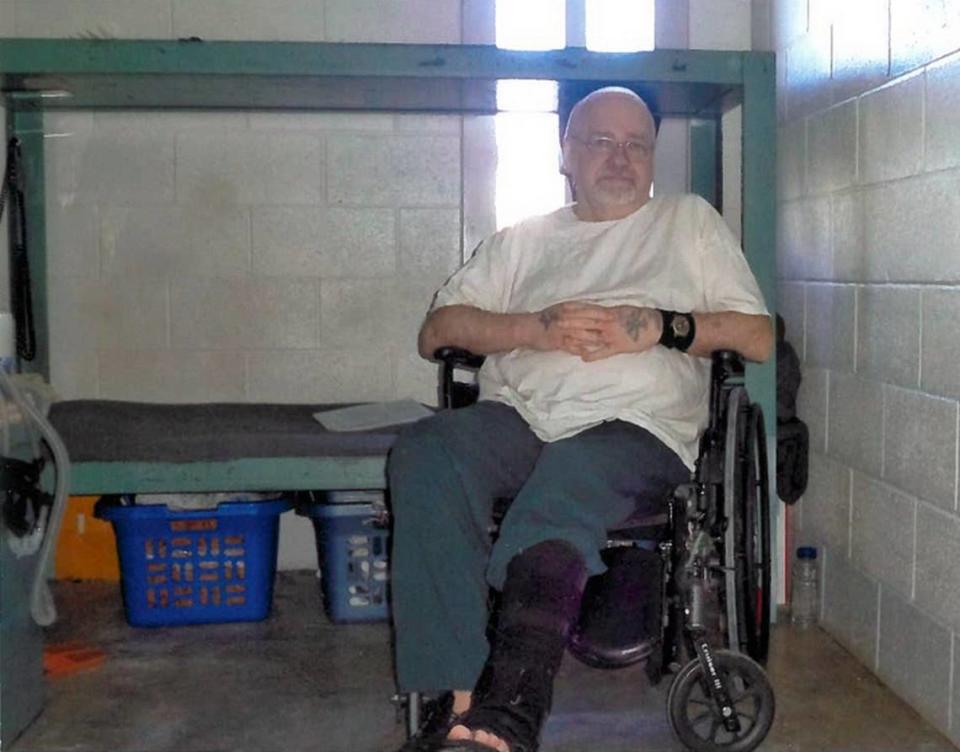Who is Thomas Creech, and what crimes did he commit in Idaho and elsewhere?
Thomas Eugene Creech, whose attempted execution by the state failed Wednesday after nearly 50 years of incarceration, is Idaho’s most notorious and longest-serving death row prisoner.
Creech’s execution by the state failed on Wednesday when lethal injections could not be administered. The 73-year-old was first charged in Idaho with killing two men in Valley County in November 1974.
He was convicted of murder for shooting to death Edward T. Arnold, 34, and John W. Bradford, 40. He was given the death penalty. His sentence was dropped a few years later to life in prison after a U.S. Supreme Court decision barred automatic death sentences following a conviction.
But already, Creech’s reputation had taken on a life of its own. In his defense at the Valley County murder trial, he testified that he had killed 42 people by the time he was 24 years old, but he denied responsibility for Arnold and Bradford’s deaths.

Creech later recanted on a third of the total, instead saying the number was actually 26 murders he committed or at least participated in. His attorneys have said the revised total remains far exaggerated.
Creech for years said, including to the Associated Press in January 1982, that 11 men gang-raped his then-wife, Thomasene White, before shoving her from a second-story building. She survived, but later took her own life at a mental hospital in Oregon.
The situation, he said, sent him on a multistate revenge tour tracking down the men he believed were responsible. He killed nine of the 11 perpetrators, Creech said as recently as his clemency hearing in January
“I went after them,” Creech told the state parole board. “All those happened within just a couple months. … I think that I did get them nine.”
Creech’s claims led many to label him as a serial killer. As someone who killed two or more people in separate incidents, he fit the definition under FBI guidelines. Following his Idaho conviction, Creech was found guilty in the June 1974 strangling death of V. Grant Robinson, 50, in Sacramento, California, and August 1974 shooting death of William J. Dean, 22, in Portland, Oregon.

In a phone interview from prison in February with The Wall Street Journal, Creech traced the four murders back to fits of rage he experienced while using amphetamines and other drugs. Statesman requests for an interview with Creech were declined by his attorneys with the legal nonprofit Federal Defender Services of Idaho.
In May 1981, Creech, then 30, got into a fight with fellow maximum security prisoner David D. Jensen, 23, who was partially disabled. Some of the facts about the incident remain in question, but Creech beat Jensen to death with a battery-filled sock. When the sock weapon broke, Creech kicked and stomped Jensen in the head and throat, splashing blood on his cell floor and walls. Jensen was sent to the hospital, where he died the next day.
“We are a family living with a tragedy,” Jensen’s daughter, Brandi Jensen, said at Creech’s clemency hearing. “We have been waiting 42 years for this chapter to be over and justice to be served.”

Creech resentenced to death
At the hearing, Ada County prosecutors said Creech’s actions in prison showed a pattern. He attacked another fellow prisoner in the months before killing Jensen, and used a razor blade mounted to a toothbrush to slice that person’s abdomen, neck and arm, said Ada County Deputy Prosecutor Jill Longhurst. The other prisoner survived.
Creech pleaded guilty to killing Jensen, bringing his total murder convictions to five across three states. He was resentenced to death in January 1982.
Creech is suspected of killing at least five other people based on evidence and his own admissions, Longhurst said. Plus, prosecutors alleged that Creech also was behind the nearly 50-year-old cold case killing of Daniel A. Walker Jr., 21, in San Bernardino County, California, in October 1974. Local prosecutors and Southern California law enforcement have shown no public proof linking Creech to the crime, and his attorneys dispute the allegation.
In his bid for a reduced sentence to life in prison, Creech was supported by several former prison workers, a former state lawmaker and even the judge who sentenced him to death. Some of them knew him as remorseful, a mentor to other prisoners and artistic. His poems, drawings and abilities playing the guitar spoke to them, they said.
During his time in prison, Creech also became a devout Christian and met his wife, LeAnn Creech, through her son, who was then a prison guard. They have been married for 25 years.
“Of course, my faith plays into anything I do,” Creech told The Wall Street Journal. “I don’t think anyone could go through this for 50 years and not believe in God.”
At his January clemency hearing before the Commission of Pardons and Parole, Creech said Jensen’s murder was the one he regretted most. In response to a commissioner’s question, Creech denied that the number of people he killed was as many as 14.
“I don’t really know for sure, I got so mixed up with lying and telling law enforcement things that I didn’t do,” Creech said. “When I was starting to kill people it was in 1974, and it was just within a matter of months when I did everything that I did.”
Idaho’s longest-serving death row prisoner wants a life sentence. He has surprising allies
Officers use pepper spray, tear gas to ‘restore order’ at Idaho maximum security prison
Idaho bill to extend death penalty unconstitutional, aims for US Supreme Court review
Idaho found lethal injection drugs for an execution. Here’s how much they cost taxpayers


